The Arctic fight for survival
As nations race for resources, indigenous people move to save their livelihoods.
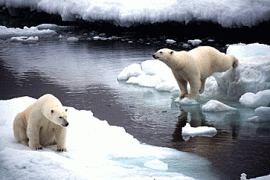
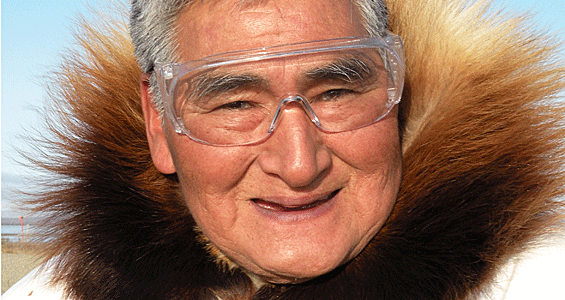 |
| Inupiat Eskimos on Kivalina fear their island will sink into the Chukchi Sea [OXDOX] |
As countries scramble to stake their claim to resource-rich land in the Arctic, the native people of the region are left with an uncertain future. Drilling for oil and gas will not only disturb the indigenous way of life – it could, along with climate change, potentially destroy it.
Al Jazeera spoke to two indigenous people from Arctic communities, with two very different ideas on how to tackle the coming change.
Keep reading
list of 4 itemsLost Futures
Photos: Greek valley that became a lake stirs drought debate
Botswana threatens to send 20,000 elephants to Germany
High up in Alaska, on the tip of an island north of the Arctic Circle, lies a small town called Kivalina. The inhabitants of this settlement are slowly moving away, as the ice surrounding their island melts into the Chukchi Sea.
| In depth |
|
|
Enoch Adams, 49, an Inupiat Eskimo from Kivalina, is one of a group of residents taking legal action against dozens of oil, electricity and coal companies over their contribution to global warming, which is destroying their home.
The average temperature on the island has risen at least three degrees Farenheit over the past 50 years, and residents believe this has led to shorter winters and longer summers, not to mention thinning ice around the island.
Adams says because of the melting ice, they cannot go out on as far to catch animals they need to eat, making it harder for their tiny community to survive in the Arctic.
But an even greater concern is melting permafrost, which threatens to sink the entire island.
“During summer, there’s been thawing of permafrost,” Adams says.
“There’s a slab up our river where a thaw has occured and it’s getting bigger. The permafrost underneath the ground just melted and the tundra has sunk into it, and created a sinkhole.
“In the back of our minds we’re next; down the sinkhole. There is that fear, that concern in the back of your mind: What if it does happen to us? Our people pray that doesn’t happen.”
Corporate responsibility
Adams says he understands the demand for oil and gas is not going to go away, but he wants the companies to understand what they are responsible for.
“Our attempt is to tell these people to stop, stop and think ‘Is this the best way to go?’ “There’s got to be a better way and we should find out what that is and proceed from there,” he says.
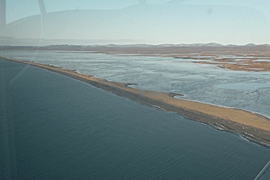 |
| Kivalina lies on the tip of an island between the Chukchi Sea and a lagoon [OXDOX] |
“We have a livelihood that we need to protect we have a way of life that needs to be preserved.
“We’ve been up here for thousands of years. We know what’s best for us up here, we know what animals to go after and what’s nutritious.”
The first hearing of the case, which accuses oil, gas and coal companies of creating a false scientific debate about global warming, began on May 19.
Adams hopes it at the very least slows their actions down.
“At least let them take a serious look at what they’ve been doing and paying for,” he says.
“They’ve been held unaccountable. They’ve acted with no regard for consequences for what they’ve done, and now the consequence of what’s taken place is a huge one.”
A different approach
On the other side of the Arctic Circle, in Finnmark, Norway, reindeer herding communities are taking a different approach to petroleum exploration in their territory.
Anders Oskal, a 36-year-old Sami from a small village in the region, believes that indigenous communities can secure their future by being realistic about the inevitability of oil and gas development and collaborating with the industry over their plans.
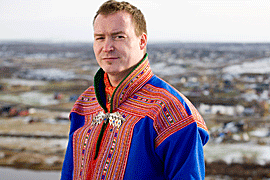 |
| Oskal wants oil companies to pump money into local communities [Benjamin Drummond] |
Oskal has a saying: The tide will lift all boats, as long as the boats are seaworthy.
“When we talk about petroleum exploration in the Arctic we could see this as a tidal wave that’s coming,” he says.
“And now it’s important to prepare the small indigenous boats so that they stay afloat not only when the tide is rolling in, but also so that they settle on an even keel when the tide retracts.”
Reindeer husbandry is a semi-nomadic, ancient way of life for indigenous people in the Arctic, with herding communities stretching from Sweden to the depths of Siberia.
Building oil and gas pipelines would create serious obstacles on migratory routes and also potentially contribute further to climate change, which is already taking its toll in the region.
Thawing earlier
Oskal, who works as the director-general of the International Centre for Reindeer Husbandry, has already witnessed rivers and lakes thawing much earlier in the year than usual.
He worries that climbing winter temperatures could allow rain to get in under the melting snow, then form a layer of ice on the ground, preventing reindeer from being able to eat the food underneath.
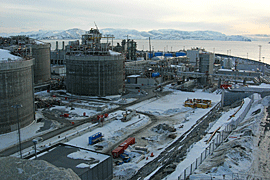 |
| Mining severely impacts the Arctic landscape[International Centre for Reindeer Husbandry] |
But while being under no illusion that his traditions are under threat, Oskal believes that oil and gas companies could benefit communities in the Arctic, by using some of their profits to help build schools, hospitals, processing plants and other infrastructure.
“Oil and gas development need not be the worst to happen to reindeer herders because as opposed to the other energy alternatives, it’s also quite profitable,” he says.
“We must have a realistic perspectives on the situation: It is not a question about if Arctic petroleum reserves will be developed, its a question about how.
Oskal says looking at the bigger picture will allow his communities to survive long past the “petroleum age”.
“Petroleum development is a snapshot in the history of reindeer-herding people, maybe 50 years,” he says.
“But we still have to live in these areas after, and we have to ask, how are we going to do this? There has to be a future for reindeer and reindeer herders also after the petroleum age.”
People & Power’s programme on the Kivalina case airs from Wednesday, May 27, 2009, at the following times GMT: Wednesday: 0600, 1230, Thursday: 0130, 1400, 1930; Friday: 0630, 1630; Saturday: 0330, 2030; Sunday: 0030, 0530; Monday: 0830.

 Gallery:
Gallery: